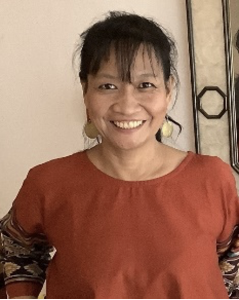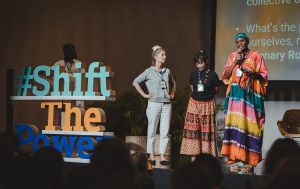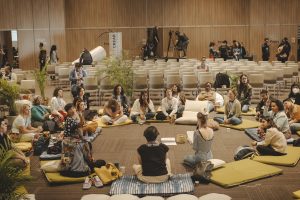Continuing the dance of the revolution
21 May 2024
Versions of this blog also appear on the Alliance magazine website and the #ShiftThePower Treehouse.

Jane dela Cruz Austria-Young, Sentrong Pagpapalakas ng Negritong Kultura at Kalikasan (SPNKK) & a #ShiftThePower Fellow.
The road to social transformation is never easy to traverse. As the saying goes, we need to slow down and take time to smell the roses and not miss a thing during the journey. This was my reflection when we provided the space for activists from different parts of the world to contemplate on their work during the session, “What’s the point of the revolution if we can’t dance? Sustaining ourselves, nurturing our movements and regenerating our activism” at the #ShiftThePower Global Summit in Bogotá.
It was an opportunity to just be in the present moment and be free to express our vulnerabilities, discuss issues of burn-out, of not feeling safe in fighting for social justice, and the feeling of isolation and not being supported. These were concrete issues of those who are at the forefront and are still committed and passionate about what they do amidst the exhaustion. The stories of activists and community philanthropists whom I met in Bogotá with the hope of shifting the power remain with me to this day.
What’s the point of the revolution if we can’t dance: the need to sustain and care for ourselves
The conversation in Bogotá confirmed that it is OK to pause and not feel guilty about it. We cannot continue to give when our cup is half empty. As Ese Emerhi of the GFCF said, “activists who experience burnout and exhaustion will be less effective at developing innovative solutions that can sustain social movements.” I remember when I was a young community organizer, my organization would make it a point to hold an annual “care for the soul” activity where we didn’t need to discuss social issues; we would dance, sing, play the guitar and pause for reflection. This was a critical aspect of what community organizing is all about — the cycle of action-reflection-action. Our mentors would remind us that as young organizers it is important to pause and care for ourselves; it is not a bourgeoisie undertaking, as it is essential that to be effective change agents frontliners are supported and cared for.
Collective care and nurturing our movements
The conversation in Bogotá affirmed that the road to shifting power is also about investing in how we practice collective care within our organizations. Burn-out is not an isolated issue but one that affects many across social movement. Collective care involves a commitment to care for each other. It is about making sure that we address the systemic issues of the society, but also attend to keeping the fire burning without burning ourselves out. As the indigenous Misak in Silva said, “It is our responsibility as indigenous people to make sure that the fire in our ritual house never goes out. Even a flicker is enough of a flame to sustain us.” Their obligation to keep the fire burning represents their responsibility of keeping an eye on individual members of their society and making sure that each one of them is safe. This is something that we need to integrate in our organizations. Strengthening networks of solidarity among ourselves is important to sustaining the movement. Supporting community organizations and movements to incorporate self and collective care practices are integral parts of sustaining our activism and nurturing our collective well-being.
Regenerating activism and intergenerational organizing
The first time I heard “regenerating activism” was when we were preparing for our bucket session for the Summit. I was taken aback, as there was much to unpack because the phrase was so new to me. During the conversation in Bogotá, it was emphasized that care needs to be contextualized to be sensitive to people’s realities. As an anthropologist by training, contextuality and sensitivity are important aspects that I value in my work. Providing collective care is not something that outsiders have asked us to do but is a felt need. Exploring care practices that work and discovering an organizational culture that allows people to be inspired and improve their well-being is something that we need to commit to. A recent conversation with three African feminists as input for their podcast reminded me that activism is something that cultivates joy, beauty, power, community, and love on the path towards freedom for ourselves and our communities amidst the multiple crises that we face. This is how they envision regenerating their movement and continuing for the long haul.
“Activism is something that cultivates joy, beauty, power, community, and love on the path towards freedom for ourselves and our communities amidst the multiple crises that we face.”
In my own context, regenerating activism is about being able to strengthen an intergenerational approach to sustaining the movement. We need all the forces in the community to make change possible. Based on my experience in working with indigenous communities, it is always the older generation that provides wisdom and lessons from the past, while the young generation brings new dynamism and new energy to realize the future they aspire to. In the context of sustaining the movement, it is critical to invest in the young generation and to strengthen intergenerational organizing. This is something that I am committed to do. There were mentors before me who invested in my own development with the hope of sustaining the movement. Now, it is my time to invest in the next generation to keep the fire burning.
The call to continue the dance of the revolution
The fire from Bogotá is taking place in different forms. One is the call to continue the dance of the revolution by engaging the international philanthropic community, donors, and advocates to take part in an honest conversation on how to support the work of the frontliners and their own welfare. Organizations that have clear strategies in building movements that value collective care and the well-being of their organizations must be supported.
Our path to social transformation cannot be accomplished by one person alone. We need a sense of community to continue the work. We must learn from other organizations that have developed tools and integrated collective care systems and contextualize them based on the needs of our communities. We need to transform the spaces within our organizations that promote solidarity and well-being.
Bogotá last December was an eye-opener for me. I realized that it is OK not to be OK, as there will be others in the movement who will continue the work if you need to pause to address your own needs. Be reminded that you are part of a bigger collective in dismantling oppression and inequality. Now, as a global community let us revisit the #ShiftThePower Manifesto for Change and decide whether it is time to add #10 on promoting self and collective care and sustaining the movement.
By: Jane dela Cruz Austria-Young, Sentrong Pagpapalakas ng Negritong Kultura at Kalikasan (SPNKK) in the Philippines and a #ShiftThePower Fellow.




